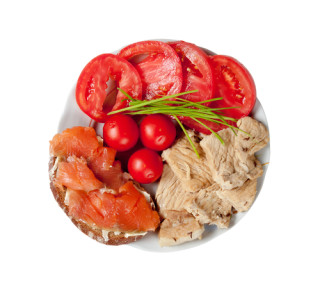Every athlete is different. There is no one-size-fits-all diet, but there are important components to keep in mind when determining your performance nutrition.
First and foremost, listen to your body and discover what works best for you. But, eating a varied diet with wholesome nutrient-rich foods like vegetables, fruits, grains, lean proteins, complex carbohydrates and healthy fats can help ensure adequate fuel for peak performance.
Below are answers to the five most common questions regarding nutrition for athletes:
1. What ratio of carbohydrates, protein and fat should an athlete consume?
 Carbohydrates are the main energy source. Individual needs will vary depending on the day and training load. It’s important to include carbohydrates in meals or snacks before or after a workout. As the workout and training intensifies, the carbohydrate intake should also increase. On average, carbohydrates should make up 55 to 65 percent of total daily calories.
Carbohydrates are the main energy source. Individual needs will vary depending on the day and training load. It’s important to include carbohydrates in meals or snacks before or after a workout. As the workout and training intensifies, the carbohydrate intake should also increase. On average, carbohydrates should make up 55 to 65 percent of total daily calories.
Example: 2,000 calories per day x .55 = 1,100 / 4 calories per gram of carbohydrate = 275 grams of carbohydrate per day
Protein helps to build and repair muscle. It’s also the building block for hormones and enzymes that regulate metabolism, support immune system and other body functions. The type of protein and when it’s eaten are just as important as the amount you take in. Protein should make up between 15 to 20 percent of total daily calories. Most people can meet these needs without supplementation through both animal and plant sources (lean beef, chicken fish, eggs, beans, nuts and seeds). Although it should be spread throughout your meals and snacks, protein is especially important within the 24 hours after a workout.
Example: 2,000 calories per day x .20 = 400 / 4 calories per gram of protein = 100 grams of protein per day
Fat is a highly concentrated energy source and the body’s main fuel at rest and during low intensity exercise. Daily fat intake should make up 20 to 25 percent of total daily calories. Restricting fat intake below 15 percent is not recommended for athletes. Consume mostly healthy unsaturated fats to keep your heart healthy.
Example: 2,000 calories per day x .25 = 500 / 9 calories per gram of protein = 55 grams of fat per day
2. Athletes burn a lot of calories during exercise, how many more calories should be consumed?
Energy requirements vary per individual based on the following factors:
- Baseline metabolic needs (at rest to support cell maintenance, temperature regulation, immune support.)
- Growth goals (weight loss or reduction of body fat or growth and gain of muscle mass)
- Physical activity (intensity, duration and frequency)
You may want to use an online calorie calculator to estimate the number of calories your body needs to maintain your current weight. If you’re looking to lose weight, subtract up to 500 calories per day to lose up to 1 pound a week. Avoid drastically cutting calories or having your total daily intake be less than 1,200 calories. Low calorie (energy) intake can negatively impact your metabolism, compromise your immune system and hormone function, impair bone density and lead to menstrual disturbances in female athletes.
If you’re looking to gain weight or put on muscle mass, add calories based on your specific goals.
3. Since athletes train so hard and burn so many calories, do they really need to avoid processed foods and sugar?
Although athletes train hard and burn more calories, carbohydrates and fat than non-athletes, it’s still just as important to choose healthy nutrient-dense foods. This means limiting your intake of highly processed foods that are often high in simple sugars, saturated and trans-fats, preservatives and artificial ingredients. Through a balanced whole foods approach to eating, you’ll ensure adequate intake of the essential nutrients, vitamins and minerals your body needs to maintain good health and improve your athletic performance.
4. What are some healthy meals and snacks to have post workout?
It’s important for your post workout meal or snack to include a combination of healthy carbohydrates and protein to replenish the energy burned and repair muscles. Examples include:
- Low fat chocolate milk (16-24 oz)
- Sports bar (look for higher fiber and protein options)
- High fiber cereal with low fat milk
- Yogurt with granola or fruit
- Whole grain toast with almond butter and a banana
- Baked potato with low fat cottage cheese
- Fruit smoothie or liquid meal supplement
5. Do I need to consume carbohydrates or electrolytes during my workout?
If your workout lasts longer than 60-90 minutes, you should consume carbohydrates to enhance your performance. The duration and intensity of exercise requires different amounts and timing of carbohydrate intake. General recommendations include:
- Less than 45 min: no carbohydrates needed (water is sufficient)
- 45-75 minutes of sustained high intensity exercise: small amounts of carbohydrates (sports drink)
- 1-2.5 hrs of endurance exercise: 30-60 g/hr of carbohydrates
- More than 2.5 hrs of endurance exercise: up to 90 g/hr or carbohydrates
During training, experiment with different refueling options to find one that suits your individual goals, hydration and digestive needs. Avoid trying anything new on competition day. What you choose to consume mid-workout needs to be full of energy, easy to digest and should be consumed with plenty of water or fluids. Here’s a few options:
- Sports drinks – around 80 calories per 12 oz serving and contains sugar and electrolytes (sodium and potassium).
- Energy chews and gels – around 100 calories per pack and contains sugar, sodium and amino acids.
- Sports beans – around 100 calories per pack and contains sugar, vitamins B, C and electrolytes (sodium and potassium).
For a more natural option, choose coconut water to replenish carbohydrates and electrolytes in place of sports drinks and fresh or dried fruit in place of the gels, chews or beans.
At the end of the day, remember to listen to your body and determine what works best for you. Track your food and fluid intake throughout your training to help you meet your nutritional goals and discover how different foods may affect your performance.


